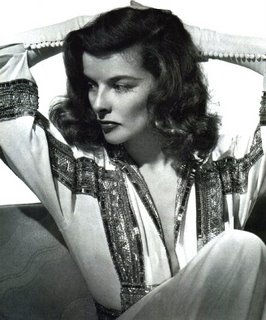Kate

Few women have managed to survive as stars in the cinema for as long as Katharine Hepburn has, although Hepburn's niche has always been a narrow one. Hepburn defined herself this way: "I have an angular face and body and I suppose an angular personality that jabs into people."
Katharine Hepburn was born on this day in 1907 in Hartford, Connecticut. With an upper-class New England accent (her parents were a prominent surgeon and a prominent suffragette) and metallic voice, finely chiseled bone structure and athletic, though graceful mannerisms, Hepburn has rather self-consciously been a stereotype (or role model, if you will) of the defiantly principled, intelligent, independent woman.
Shortly after her graduation from Bryn Mawr, Hepburn began playing roles on Broadway, and achieved critical success in The Warrior's Husband (1932) after having been hired, fired for insubordination and rehired for the role prior to the opening. RKO offered her a film contract; she asked for a ridiculous fee, was surprised to find that RKO would match her demand, and starred in 14 films of varying quality, including her debut A Bill of Divorcement (1932, directed by frequent collaborator George Cukor and co-starring John Barrymore), Morning Glory (1933, for which she won her first of 4 Oscars), Stage Door (1937, with Ginger Rogers) and Bringing Up Baby (1938; directed by Howard Hawks and co-starring Cary Grant).
Although she had her successes, Hollywood was often at a loss with what to do with her prickly persona, deciding in the late 1930s that she was not screen idol material (Hepburn says they branded her "box office poison"); and for her stridence and self-confidence she was often an easy critical target (Dorothy Parker once wrote that a Hepburn stage performance "ran the gamut of emotions from A to B."). Her friend Philip Barry then wrote a Broadway vehicle for her, The Philadelphia Story, which she starred in to rave reviews. She wisely bargained for the film rights before the play's debut, and after its success, was in a position to name her price when Louis B. Mayer attempted to purchase the play: she dictated the choice of director (Cukor) and co-stars (Cary Grant and James Stewart), and the film was a box office triumph in 1940.
During her next film at MGM, Woman of the Year (1942) she formed a personal attachment to co-star Spencer Tracy. Although Tracy was married, he had long been separated from his wife; Hepburn was married briefly many years before, and had been romantically linked with such people as John Ford and Howard Hughes. The Tracy-Hepburn affair was an open secret in Hollywood -- gossip columnists, out of deference to the highly respected couple, stayed away from the subject during the 27 years they spent together, until Tracy's death in 1967.
She acted with Tracy in a number of films through the 1960s, but also worked on independent "prestige" projects which provided a forum for her idiosyncratic screen presence: notably, John Huston's The African Queen (1951, with Humphrey Bogart), Suddenly Last Summer (1959, based on the Tennessee Williams play, with Elizabeth Taylor and Montgomery Clift), Long Day's Journey into Night (1962, based on the Eugene O'Neill play), The Lion in Winter (1968, as Eleanor of Aquitaine, with Peter O'Toole), The Trojan Women (1971, based on the Euripides play) and On Golden Pond (1981, with Henry and Jane Fonda). She passed away on June 29, 2003 in Old Saybrook, Connecticut.
Labels: Classic Cinema





1 Comments:
She was indeed Eleanor of Aquitaine in the "The Lion of Winter." When I read the earlier Eleanor post all I could think of was how splendley she fit herself into that role.
How are things overseas?
Post a Comment
Subscribe to Post Comments [Atom]
<< Home